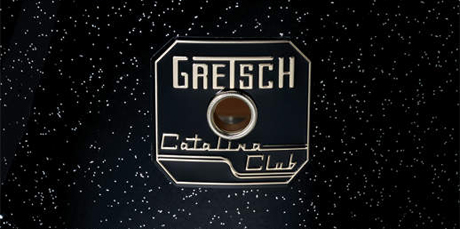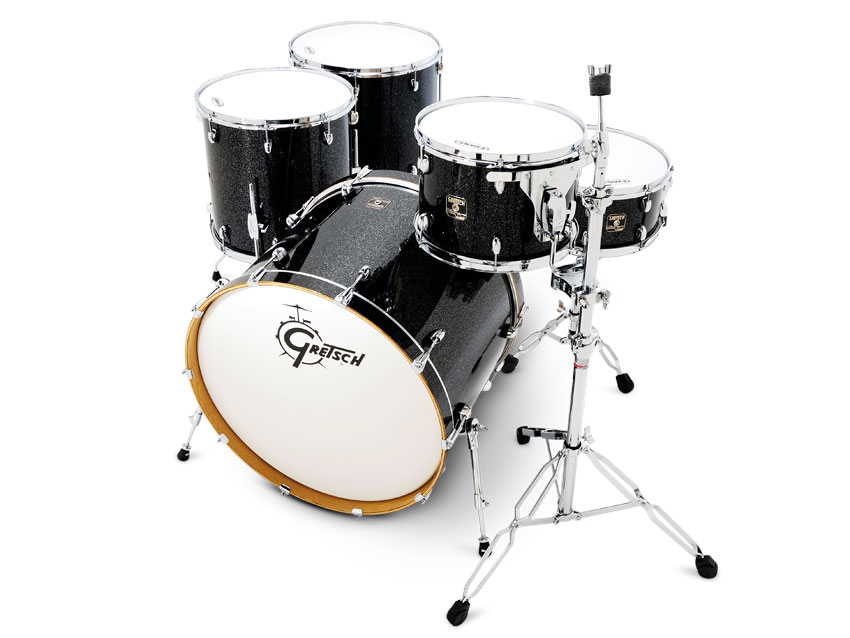MusicRadar Verdict
Gretsch's Catalina Club range was one of the original mid-market trailblazers, offering a variety of sizes, good looks and decent quality. The revised range builds on that solid foundation with the very fetching sparkle lacquers, classic rock sizes and great sound.
Pros
- +
A great value package. Packs a huge range - from warm sounds to deep growls.
Cons
- -
It's big - check your car size before buying. The tom holder was below par.
MusicRadar's got your back
There's something deeply evocative about the 'one up, two down' set-up - it just screams "authentic rock" in a way that few other configurations can match. Of course, before Bonham et al, it was the favoured set up of Buddy Rich, albeit with two identical floor toms -although Buddy famously used his second 16" as a stand for his towel and spare sticks!
Gretsch's Catalina Club range has been around in its various forms for a while, but the one that always got the most attention was the Club Rock drum kit with its ginormous 26" bass drum. Perhaps realising that not everyone can buy a new car to cart their kit around, Gretsch now offers the Club Rock with a marginally-more sensible 24" bass drum and two new finishes.
"The 13" tom was warm and strident, the 16" growled like a large-capacity V8 and the 18" rumbled like an avalanche!"
Fancy joining Page, Plant and Jones at their next reunion gig? Look no further...
Build
When this most recent iteration of the Catalina name was introduced, it was positioned one step above Gretsch's entry-level Blackhawk drums, but the Catalina Club line quickly gained a good reputation amongst working drummers for the quality construction and wide choice of sizes.
The Club Rock shell pack features nine-ply mahogany shells that are finished with a unique lacquer, shot through with sparkly metallic flakes, giving a 'galaxy sparkle' effect that's reminiscent of the very rare Gretsch Anniversary Sparkle kits of the '60s.

The 24"x18" bass drum is undrilled and features matching wood hoops. The drums are fitted with Gretsch's 'mini lug' take on its USA Custom lug and sport dapper black and silver 'Catalina' badges. The shells are generally well-finished inside and out and the rounded bearing edges smooth and even, though there was evidence of some glue spillage on the shell at the seam of the bass drum.
The toms and snare are all fitted with premium Evans G1 coated single-ply heads, while the bass drum has a pre-damped clear batter and a coated display head. The snare features a generic but functional throw-off and 20-strand steel snare wires. The 13" tom is fitted with Gretsch's Mini GTS tom suspension system.
Want all the hottest music and gear news, reviews, deals, features and more, direct to your inbox? Sign up here.
Hands on
Straight out of the box, the Club Rock displayed a wide tuning range that we attributed to the single-ply heads and well-finished bearing edges. Despite this, there was only one place it really wanted to be - low-down and dirty!
With the tom heads at a medium tension, the 13" tom was warm and strident, the 16" growled like a large-capacity V8 and the 18" rumbled like an avalanche. The real seismic stuff, though, was left to the bass drum -with the heads just one turn above slack there was more of a trouser-flapping 'whoompf!' than a defined bass drum note.
A couple of half-turns with a drum key brought out the fundamental tone, a low, throaty thump that cried out for triplets from a squeaking Speed King and a fast foot. Unmiked, the bass drum carried throughout the venue well and the bright attack and sustain of the single-ply heads meant they cut through the mix too, although we had mild concerns about the durability of the G1s under non-stop heavy-hitting.
The snare preferred a middling tuning, choking when the tension was taken right up, but offering a woody, rounded rim shot when loosened off. The black sparkle lacquer finish glittered under the stage lights, which when taken with the sheer size of the kit made for a very prominent stage presence indeed.
The only real negative was the supplied generic tom holder - we were unable to get it to hold the 13" tom in place, and eventually resorted to half-balancing the tom on top of a beer mat taped to the bass drum to try to stabilise it. We'd recommend trying it in the shop, as this problem could've been a one-off.
